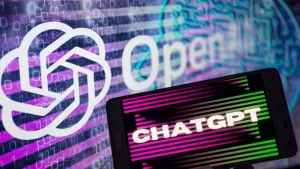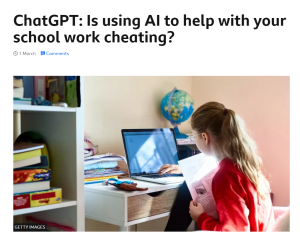
Story proposal
I am interested in writing a feature that explores what role AI tools will play in a student’s academic career. I will be interviewing students, teachers, and experts who study AI to explore what positive or negative effects AI can have on students from a learning perspective, given that most Australian schools are listing Chat GPT as a cheating tool.
Story and Pitch
Chat GPT has attracted the attention of Internet users worldwide since its release in 2022. Chat GPT, a search engine equipped with artificial intelligence, has quickly attracted the attention of the academic community with its accurate search results and user-friendly answers.
In 2023, several student users on social media shared posts about their assignments being ruled as plagiarism cheating. On 9 April 2023, BBC news also reported incidents of students using Chat GPT to cheat academically.

As a search engine equipped with artificial intelligence, Chat GPT can give precise answers based on the questions asked by the user. This is where students have chosen to speculate and use Chat GPT to cheat. The AI tool is gradually being banned from schools as several news media organizations report news of students using Chat GPT to cheat.
Through my feature, I will focus on the following points.
- presenting students’ perspectives on the use of AI tools
- highlighting the use of AI in academic careers
- presenting incidents where AI has helped students cheat to generate public discussion
- seek the help of AI professionals to explore whether there is a compromise between cheating and learning assistance
This feature will focus on how AI tools will affect students’ learning careers from the students’ perspective and whether AI tools will have a transformative impact on the future model of education.
Information sources
I will consult with PhDs from the University of Technology Sydney to ensure that specialist content related to AI is authoritative. Concurrently, I will take interviews, organize information for scholarly articles, and use published multimedia to provide readers with perspective and background material.
Sources include (tentatively)
- Ferdinand Shi PhD in Artificial Intelligence, University of Technology Sydney
- Lishan Xie Current student at the University of Sydney
- Aaron Liu 8-year veteran teacher
- BBC News documentary on Chat GPT
Preferred Publication and Target Audience
This feature will be targeted at a wider group of students and teachers and is therefore ideal for the BBC news or ABC News. As the news organization with the widest audience in the world today, BBC News can extend the reach of this story to the world. ABC news, as a local Australian news organization, could extend the reach of this story and provide some reference value for local Australian universities.
Multimedia, Hypertext, and Interactivity
This feature will include:
- Audio or video recordings of interviews with the permission of the interviewer
- Embedded images related to artificial intelligence.
- Pointers to all available hyperlinks, including websites.
- Contact details of the person mentioned in the feature.
(word count:509)
Please feel free to leave your suggestions in the comments below, thank you very much!

It would be a very interesting idea to distingush the differences of cheating and using chatGPT as a proofreading tool, and that applies directly to our life in University. I would say that it would be necessary to keep an eye on all potential misses of AI softwares, while they currently behave only as tools and a product of programmers without authentic intelligence, the over reliance on the AI would hurt in some cases as the authors who misuses AI does not know the actual knowledge that they apply in different situations. For instance, a programmer who programs and a student who uses chatgpt for program codes have a essential difference in the latter neither cannot correct himself if the AI malfunctions, nor acquiring the skills of programming the codes.
Your suggestion is worth considering, as the use of ChatGPT to cheat academically is very serious, and the academic integrity of each student is at stake. The background material on ChatGPT that students use for assignments is adequate, and the sources of information are authoritative. Overall, the proposal is well constructed, engaging, and educational.
However, you could add credibility and depth to your story by including data and statistics on AI and education. For example, you could include data on the percentage of students who use AI tools to cheat, or statistics on the effectiveness of AI tools for learning support.
Your story proposal is an interesting and timely one considering the potential consequences of the misuse of AI tools in education. There are some suggestions for improving:
1. The proposal should be supported by an appropriate addition of a data survey to make it easier for readers to access the information.
2. The proposal deserves to consider including the perspectives of parents, school administrators, and policy makers to get a more comprehensive understanding of the issue.
3. It is worth considering including interactive elements, such as polls or quizzes, to encourage readers to think more deeply about the topic.